December 4, 2024
The Ebiil Society: Champions of Palau
Ann Singeo, founder of our partner organization the Ebiil Society, shares her vision for a thriving Palau and a flourishing world of indigenous science!
We use cookies to help you navigate efficiently and perform certain functions. You will find detailed information about all cookies under each consent category below.
The cookies that are categorized as "Necessary" are stored on your browser as they are essential for enabling the basic functionalities of the site. ...
Necessary cookies are required to enable the basic features of this site, such as providing secure log-in or adjusting your consent preferences. These cookies do not store any personally identifiable data.
Functional cookies help perform certain functionalities like sharing the content of the website on social media platforms, collecting feedback, and other third-party features.
Analytical cookies are used to understand how visitors interact with the website. These cookies help provide information on metrics such as the number of visitors, bounce rate, traffic source, etc.
Performance cookies are used to understand and analyze the key performance indexes of the website which helps in delivering a better user experience for the visitors.
Advertisement cookies are used to provide visitors with customized advertisements based on the pages you visited previously and to analyze the effectiveness of the ad campaigns.
Looking to make an impact this Earth Month? Here’s how.

A little over one year after the implementation of a project to remove invasive mice from Antipodes Island, New Zealand, the native birds appear to be thriving and the island remains mouse-free. Although the confirmation will not occur until 2018, the one-year mark is a positive sign for the island’s recovery.
Antipodes Island is a 22 km2 (13m2) island southeast of New Zealand and is home to 21 species of seabirds and 2 endemic species of ground birds. Now, without the threat of 200,000 invasive mice, native plants and animals have a chance to thrive. For years invasive species had inhibited native Antipodean Albatross, Antipodean Parakeets, and Reischek’s Parakeets from breeding. Now the endemic parakeets can forage safely, and without mice there is more food to go around.

The project was part of the Million Dollar Mouse campaign that Island Conservation and partners worked to remove invasive mice from the island. A year after the project was implemented the signs of recovery on the island are positive, but the island’s invasive-free status cannot be confirmed quite yet. For a project of this magnitude, two breeding seasons need to pass to ensure no remaining invasive mice are hiding on the island. Hopefully, the 2018 visit to Antipodes will yield more positive news and an official confirmation.
Featured: An Antipodean Wandering Albatross and chick. Credit: Jason Zito/Island Conservation
Source: Predator Free New Zealand
Check out other journal entries we think you might be interested in.
Notifications